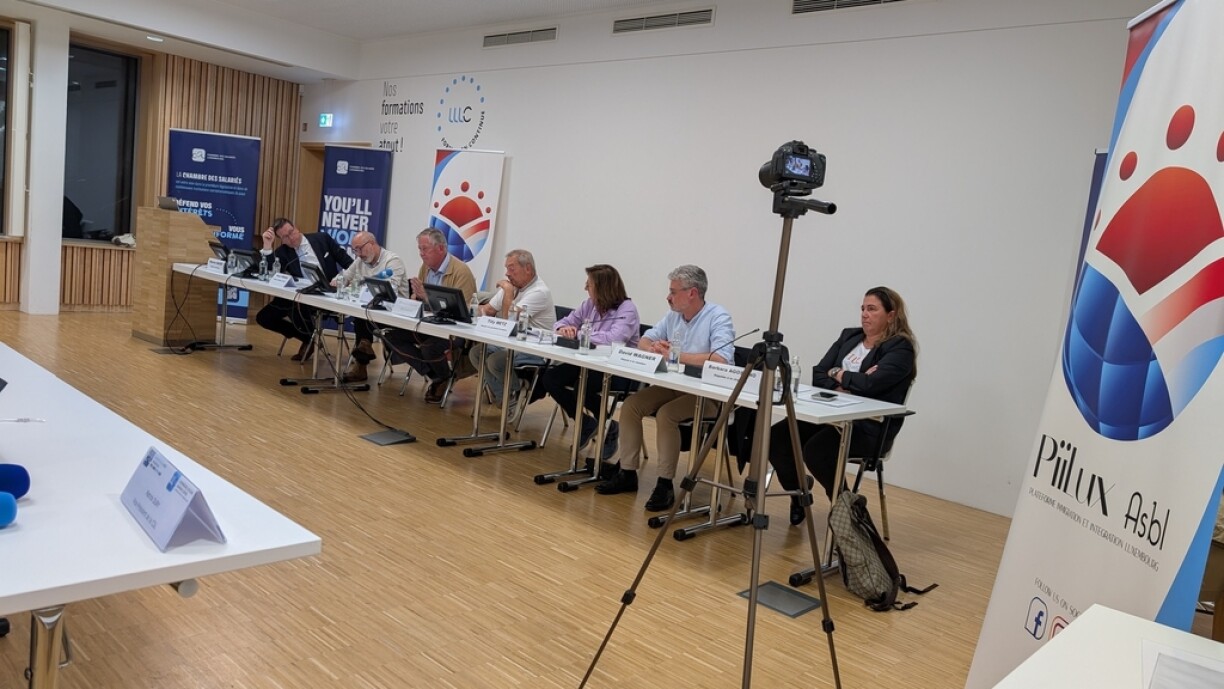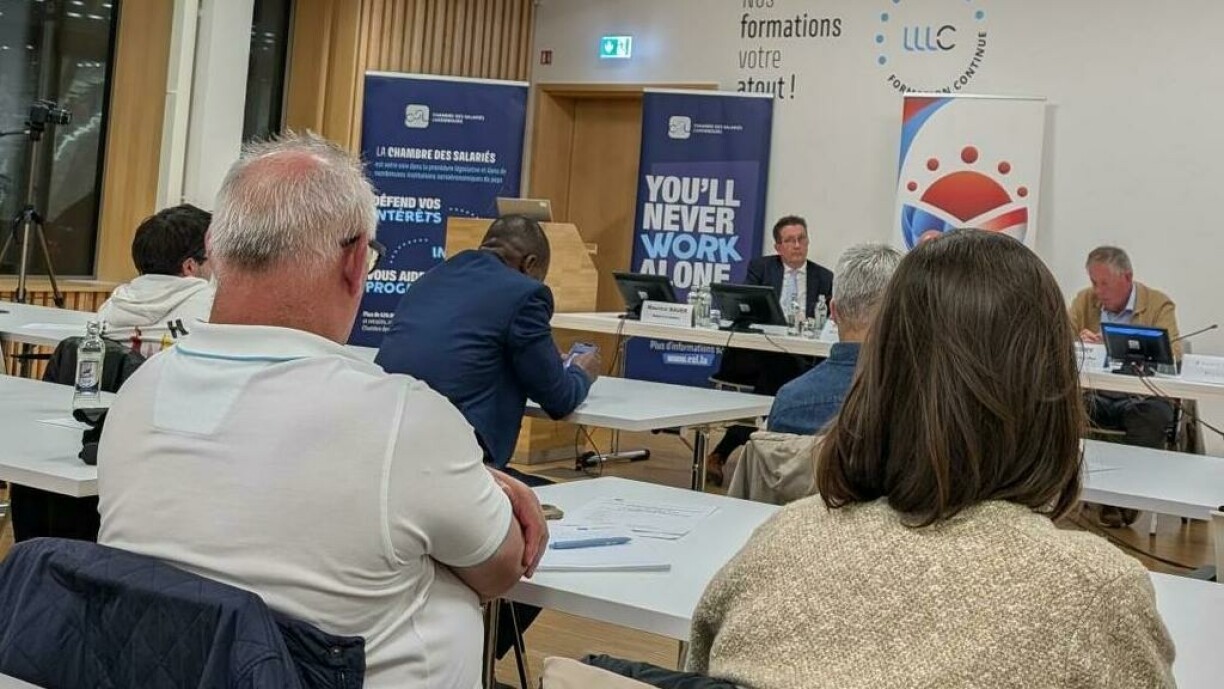
Ten years ago, Luxembourg voters rejected by referendum the granting of voting rights to non-Luxembourg nationals, and to young people aged 16 and over. In 2015, the population of Luxembourg was about 576,200, with a foreign population of approximately 43%.
A decade later, plenty has changed and there is much to discuss. The population has grown remarkably to 680,000, with a 4% increase of foreigners.
This has resulted in a “major democratic deficit in our country”, says the Platform of Immigration and Integration Luxembourg (PiiLux asbl), a non-profit that hosted a roundtable discussion of the matter at the Chamber of Employees (Chambre des salariés) on Monday night.
Present for the discussion were representatives from the governing Democratic Party (DP) and the Christian Social People’s Party (CSV), as well as the Luxembourg Socialist Workers’ Party (LSAP), the Greens (déi Gréng), and the Left (déi Lénk). Hosting the discussion was Franco Barilozzi from PiiLux.

Organisers wasted no time in drawing attention to a unique factor of Luxembourg: 48% of residents do not have Luxembourg nationality, and therefore do not have the right to vote in national elections.
This, PiiLux stated in a handout given to all attendees, is a “democratic paradox gradually undermining the legitimacy of the current political system”.
Also present was the Association for the Support of Immigrant Workers (ASTI), which ran a poll earlier this year and found that 66% of participants said they are now in favour of introducing voting rights for foreigners in legislative elections.
ASTI and PiiLux are therefore proposing two concrete steps:
As the roundtable discussion on these matters commenced, political parties and their representatives took turns at outlining their current stance on the matter of voting rights.
Maurice Bauer, CSV:
“What I find unpleasant about the 2015 referendum is that the government of that time still has the responsibility today of having created a rift in Luxembourgish society. This campaign was quite painful, and in my opinion, we have not yet managed to heal the wound that was inflicted at that time. The emergence of parties, or the resurgence of extreme right-wing parties, in my view, has not at all represented a step in the right direction.
I believe that we should try a different approach. I dare say here today that if a referendum had been held in 2008 to introduce dual nationality, we would still not have it today. Because there would have also been a refusal.
The government in 2008 took the lead, sought dialogue with opposition parties to find a consensus. And when a consensus was reached on the modalities to implement the law on dual nationality, we went to the Parliament, took the vote, and this dual nationality passed without much discussion.
I believe that this is the path that should be taken. Instead of wanting to isolate one actor from the other, we would have been better off seeking consensus in discussion with the people to arrive at a clear understanding of the situation.”

Barbara Agostino, DP:
“We can have a thousand campaigns, a thousand political debates. You might have seen the room, I always see the same people seated. It’s always the same ones who are interested and it’s always the same ones who are uninterested, though uninterested might be a strong word.
Let me give you an example: If on a Saturday afternoon, people have the choice to go to the museum, or take care of the house, I can tell you that the people I know around me are middle-class people, socially [average], they will take care of their house. They don’t have time to go to the museum or get involved in politics because they have many other problems.
And what I suggest, to get them a little interested in Luxembourg or in politics, is not for them to come to us, but for us to go to them. Because the workers I know discuss their problems in cafes – that’s where we can reach them. And I think that’s the problem. The [gap] is too big between the people who do politics and those who are not interested, respectively those who do not really understand what we are doing.”
Alex Bodry, LSAP:
“There is much more flexibility in the new text of the Constitution. And for me, the only way to broaden participation for non-Luxembourgers as well, is firstly to use all means that exist.
There is the right to vote in municipal elections. You can run as a candidate. It is not limited to active voting rights. It exists for professional chambers. Initially, we must use these existing means. They are not sufficiently used at this moment. If I look at the numbers, for me, it is extremely difficult.
And I even wonder if most non-Luxembourgers truly believe that extending the right to vote would be the panacea right now. If I look at the latest poll that was mentioned, there is a proposal to improve the functioning of democracy, that of extending the right to vote for national elections to foreigners, it is only supported by 31%. And well, it’s in last place among all the proposals.
We don’t really manage to agree on this, obviously, [but] no party is currently saying that we need to have a new referendum on this issue tomorrow.”
Tilly Metz, The Greens:
“We have a democratic deficit. There are people who work, who live in Luxembourg, who pay taxes in Luxembourg, who have children in Luxembourg, who are consumers in Luxembourg, who have no say whatsoever. So, it’s a form of apartheid here, with 48% of the people who live, consume, and pay taxes here unable to vote.
It’s very good that the issue is being brought up again, as giving the right to vote also promotes inclusion, which is an important factor for integration. So we see that there are plenty of arguments for it, but I think we need to prepare the ground well, and we need to proceed gradually.”
David Wagner, The Left:
“Referendums are always problematic, because with a referendum, it’s still often those at the top who pose the questions. I would like the population to be able to come up with answers as well. And that’s where we find ourselves, precisely because we’re in a representative democracy, the state is in crisis.
It does not mean that we should return to more autocracy; on the contrary, we must move towards even more democracy, giving people even more power in a whole host of political decisions. As a member of parliament, I can tell you that it’s not good. As an MP, even if you work incredibly hard and are extremely intelligent, you cannot take on, vote on, and bear the responsibility for decisions in place of others; it’s just not possible.”